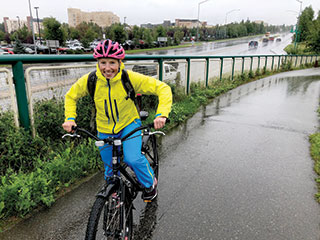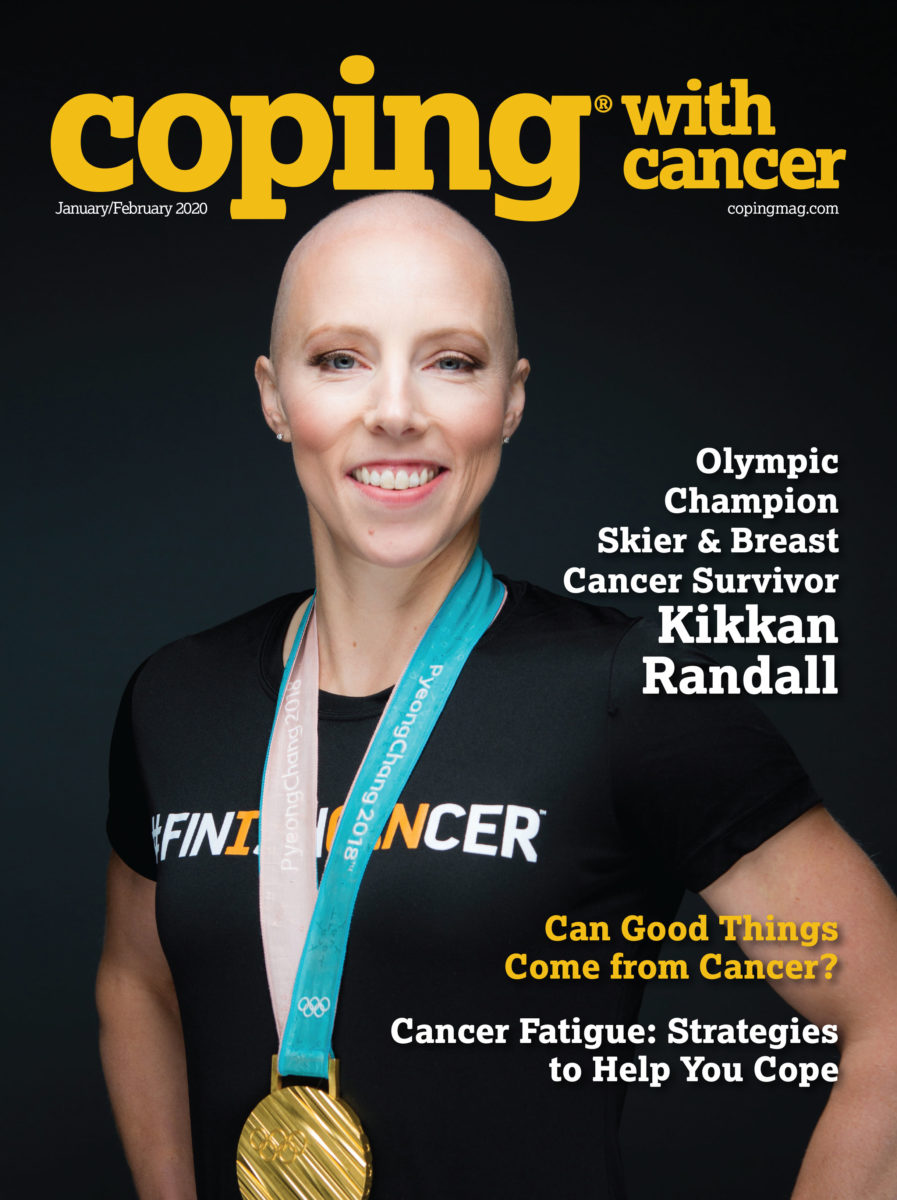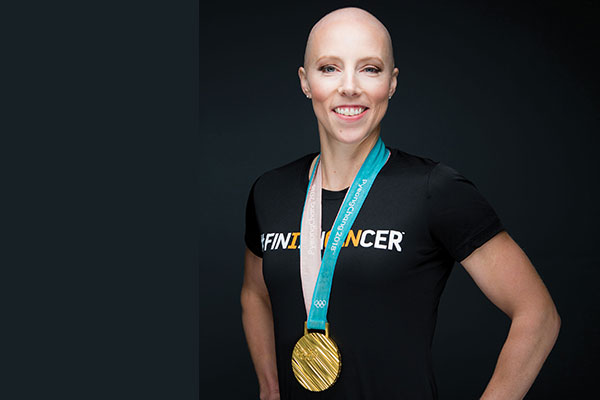Olympic Champion Skier Kikkan Randall
On Staying Positive and Active through Breast Cancer
by Kaylene Isherwood
In February 2018, five-time Olympian Kikkan Randall made cross-country skiing history when she and teammate Jessie Diggins won the women’s team sprint freestyle race at the PyeongChang Winter Olympics, becoming the first ever Americans to win Olympic gold in cross-country skiing. As the final event of Kikkan’s final Olympics, it was a storybook ending to a 20-year Olympic career. After 17 U.S. National titles and 29 World Cup podiums, she had finally won an Olympic medal. And it was gold.
“For me, I knew it was going to be my last Olympic race,” Kikkan shares in a recent interview with Coping magazine. “And for that gold medal to have come in that moment, you couldn’t have written the story any better.”
The next chapter
Naturally, feeling on cloud nine following the spectacular end to her Olympic ski career, Kikkan was in a period of transition, trying to figure out the next chapter of her life. She was also moving from Alaska to British Columbia with her husband and two-year-old son, Breck, making for another big change in her life.
I felt amazing. I felt strong and healthy. I knew I had done all the things they tell you to do to prevent cancer, so I just couldn’t believe that it happened.
Mother’s Day 2018 also marked the beginning of yet another chapter for her. That evening, she found a lump on her breast, and the following day she went to a walk-in clinic. The doctor thought the lump wasn’t anything to worry about but recommended doing some follow-up scans. Within a couple of weeks, she went in for a mammogram and ultrasound, and the results were concerning enough to call for a biopsy.

The diagnosis
On May 31, 2018, three months after winning a gold medal and just a few weeks after officially retiring from skiing, Kikkan received a shocking diagnosis. She had an aggressive form of breast cancer.
“The timing for these kinds of things is never right,” Kikkan says. “I think the first emotions were just disbelief because I was a few weeks off from my ski career. I felt amazing. I felt strong and healthy. I knew I had done all the things they tell you to do to prevent cancer, so I just couldn’t believe that it happened. But at the same time, I think the athlete frame of mind took over and I said OK, I’ve just got to tackle this like I would have tackled any other goal.”
The first steps
Moving to a new country always has its difficulties, but being diagnosed with cancer after having just moved to a new place brings forward added challenges. As Kikkan had recently moved to Canada, she didn’t qualify to use the healthcare system there, so she had to figure out what she was going to do for treatment.
Since she was retiring from skiing, Kikkan was about to lose the insurance coverage provided her by the U.S. Olympic Committee. However, they were able to extend her coverage for another year by keeping her on the roster. That required her to find a treatment center in the U.S., so she began commuting to Alaska for treatment, as that is where she grew up and where her support system is.
Because having another child was important to Kikkan and her husband, she underwent a round of in vitro fertilization before starting cancer treatment. Through IVF, the couple was able to preserve one embryo. “That gives us just a little bit of hope that when I’m through most of my treatment that we can try and have another baby,” Kikkan shares.
The treatment plan and side effects
To treat her stage II triple-positive breast cancer, Kikkan underwent six rounds of chemotherapy. During the infusions, she wore ice mittens and socks in hopes of preventing neuropathy. During her first round, she developed mouth sores and her taste buds went flat, making eating difficult. Later on, she picked up a cold from her two-year-old son, a sign that her immune system wasn’t as strong as it was when she was healthy.
During treatment, especially while undergoing chemotherapy, one of Kikkan’s top goals was to be active every day. “I wanted to stay active through my treatment,” she shares. “So, I actually rode my bike to and from each of my chemotherapy sessions. And that was my way of getting a little victory and a little activity every day and helping my body process the chemotherapy.”
Having finished chemotherapy in October 2018, Kikkan underwent surgery two weeks later. After seeing a good response from the chemotherapy, she opted for a lumpectomy. The first pathology report revealed clear margins on all sides. However, one side was a little close for comfort, according to Kikkan, so her surgeon went back in and took out more, giving her fully clear margins.

That December, Kikkan started seven weeks of radiation. She had her last round on January 25, 2019, and she considers that to be the last major part of her treatment plan. “At that point, I could kind of say alright I can get back into normal life again and start looking forward,” Kikkan says.
Kikkan is currently in remission. Since completing radiation, she has been taking an aromatase inhibitor daily and will continue doing so for at least five years.
It’s going to be OK
During treatment, Kikkan wore rainbow shoes and bright-colored socks to help her keep a positive mindset. Since it worked so well to help buoy her spirits, Kikkan was inspired to create “It’s Going to be OK” rainbow socks to share the same hope with others.
“The socks themselves can be a great tool for someone to give them the courage to get through a tough day of chemo or whatever it is they’re facing,” Kikkan says. “Bright colors really helped remind me to stay hopeful. I think you can put on your happy socks and you can get through the toughest days just by that little reminder.”
Kikkan has sold over 6,000 pairs of the socks, and $2 from every pair purchased goes to AKTIV Against Cancer, a nonprofit with a mission of incorporating physical activity into cancer treatment.
Reaching another milestone
After finishing chemotherapy, Kikkan attended the 2018 New York City Marathon in November to support friends and former teammates who were competing in the race. She had originally planned to run the marathon herself, but cancer had other plans for her.
While standing at the finish line, Kikkan felt inspired to set a goal of running the marathon in 2019 once she had completed active treatment for her breast cancer. It would be her first ever marathon, not just her first as a cancer survivor.
With her sights set on finishing the race in under three hours, Kikkan began a challenging, no-excuses training regimen. Her cancer diagnosis was not going to hold her back.
Less than a year after completing her last round of radiation treatment, Kikkan not only finished the marathon, but she smashed her goal, clocking an impressive 2 hours, 55 minutes, 12 seconds.
“To put down 26 miles, to reach my goal, to cross that finish line, and to think back over the year that had transpired since, it was such an incredible victory – like proving to myself that I had made it back,” Kikkan shares. “I think I ran that marathon as fast as I ever would have even had I never had cancer in the first place.”
Sharing her journey
Kikkan was open about her diagnosis from the beginning and documented much of her cancer journey through social media and her blog (which you can find at kikkan.com). After announcing her diagnosis on Instagram, she received an outpouring of support. Kikkan believes sharing her experience helped her get through it.
“I had always been very open about my journey through my athletic career,” the former Olympic skier says. “I felt like it was an amazing opportunity as an athlete to have this platform to inspire people and bring them along the journey with you. I always felt it was important to show the lows as much as it was the highs. I mean everybody loves the medals and the podium ceremonies, but I think where people can really relate is those really human moments where we all struggle.”
The future
Currently, Kikkan spends a lot of time traveling the country as a motivational speaker. She also works with the International Committee for Athlete Advocacy and is president of the USA division of Fast and Female, a charity with a mission of keeping girls healthy and active in sports. She is passionate about promoting healthy and active lifestyles and feels that being active was key in her cancer recovery.
“Now, cancer is part of my story,” Kikkan says. “It’s opened up some new opportunities to actually get out and share some of the experiences I’ve had and to continue to raise awareness and promote early detection and help others going through it. I’ve always enjoyed speaking and sharing my stories in hopes that people can find little nuggets that can help them through their challenges or to dream big and be healthy.”

You can keep up with Kikkan Randall by following her on Instagram and Twitter: @kikkanimal. To learn more about Kikkan (and to check out her “It’s Going to be OK” socks), visit Kikkan.com.
This article was published in Coping® with Cancer magazine, January/February 2020.


